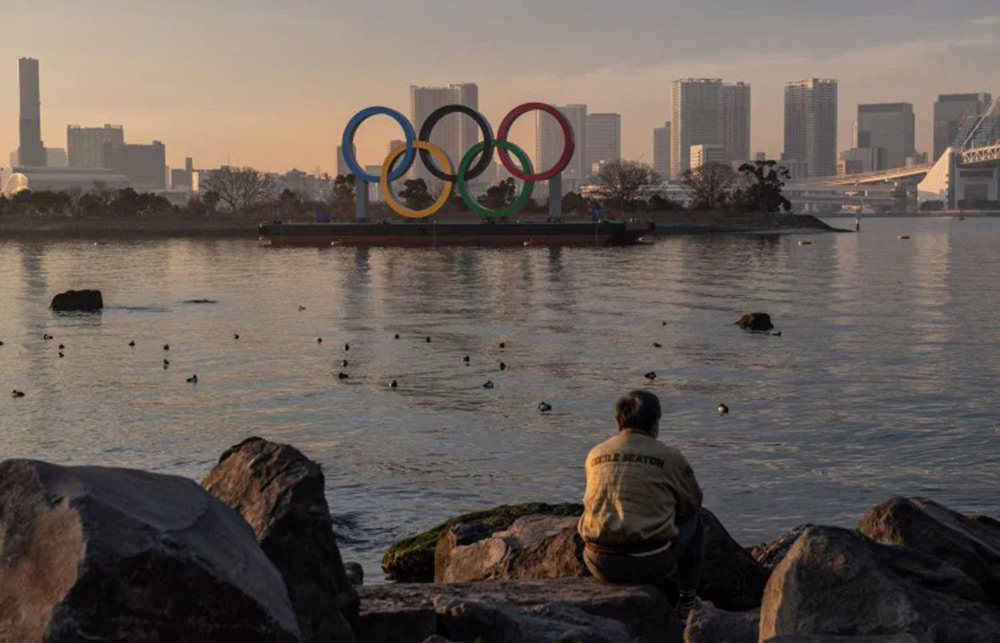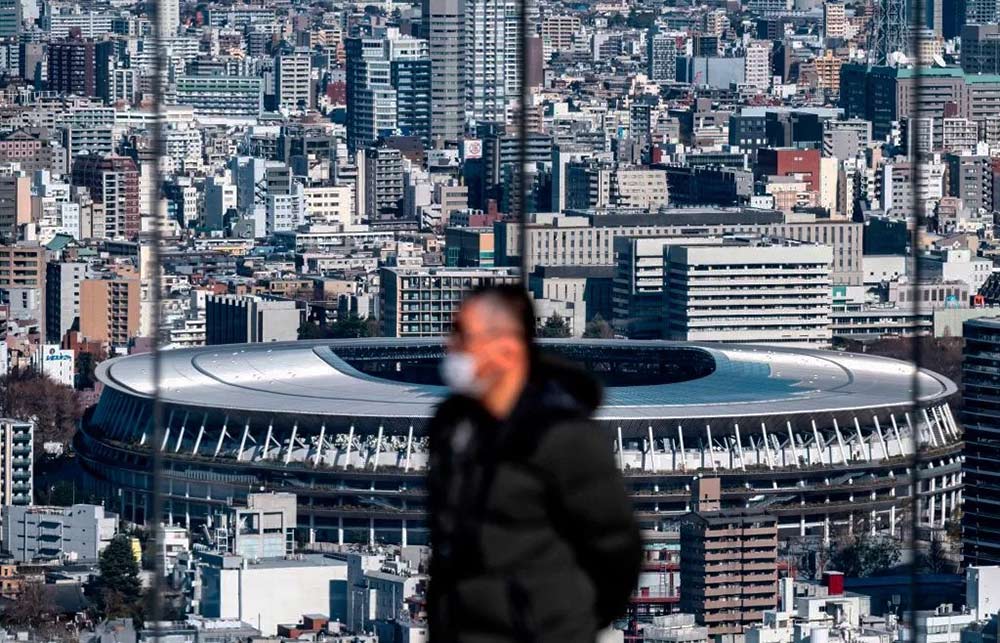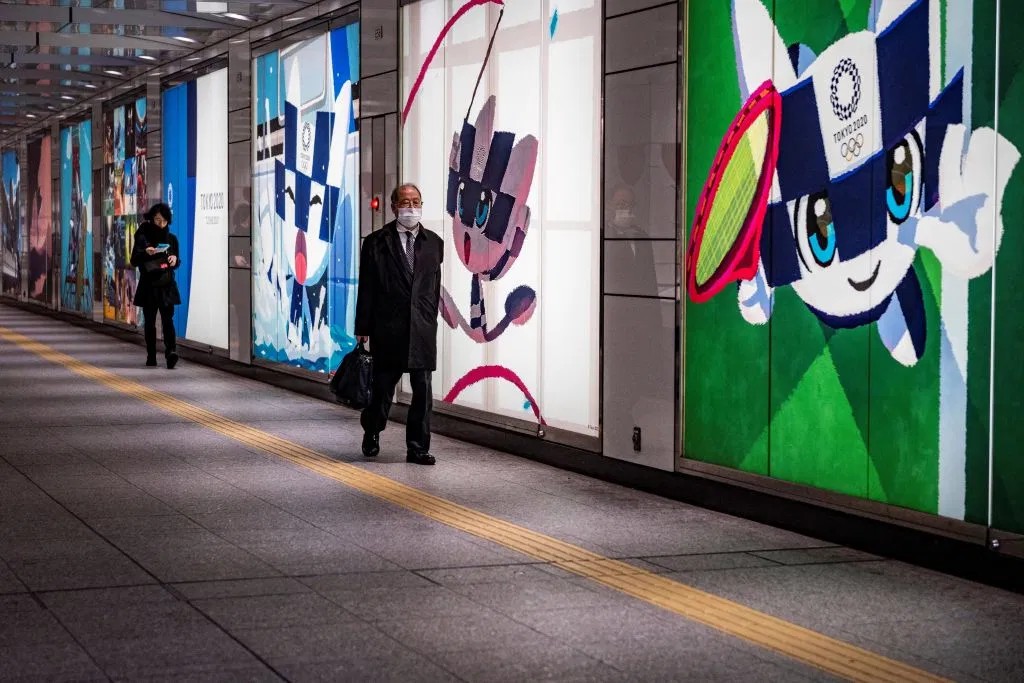受新冠疫情影响,东京被迫推迟了原定于去年举办的2020年夏季奥运会和残奥会,并下定决心在2021年7月23日至8月8日期间举办。
在今年1月举办的世界经济论坛上,日本首相菅义伟对代表团表示,推迟举办的夏季奥运会将是“人类战胜病毒的证明。”
但目前看来,胜利仍然遥遥无期。

日本于2月17日启动新冠疫苗接种工作,政府为作为首批接种对象的一线医护人员分配了40,000剂辉瑞疫苗。但美联社引用专家的话称,在7月奥运会开幕之前,日本不可能靠疫苗实现群体免疫。
与此同时,全球多个人口大国仍然无法控制每日新增病例,而且疫苗至少还要再等一年才能够在全球大范围施打。时至今日,日本仍有多个县为了应对突如其来的新一轮疫情高潮,宣布进入了紧急状态。
2月2日,菅义伟将紧急状态延长至3月7日,因为虽然病例有所减少,但医院依旧疲于应付。
由于新冠病毒仍然无法得到控制,日本国民已经对奥运会失去了兴趣。
据日本共同社的一项调查显示,80%的受访者希望取消2020年奥运会(现在要称为2021年奥运会)或者再次改期举行。
但菅义伟和东京奥组委的前主席森喜朗(他曾经称女性说话太多,并因为这番性别歧视言论在2月下台)却执意要继续举办奥运会。
在日本执政党自民党于2月召开的会议上,森喜朗对议员们表示:“无论新冠疫情形势如何,我们都将举办奥运会。”他指出,政府应该讨论如何举办奥运会,而不是是否举办奥运会。
森喜朗的态度与国际奥委会主席托马斯•巴赫在1月召开的新闻发布会上所表达的立场如出一辙。他对记者称:“我们不会再纠结于是否举办奥运会,我们要解决的是如何举办奥运会。”
那么,2021年奥运会到底将如何举办?是否需要隔离?
2月3日,东京奥委会向参加奥运会的运动联合会官员发布了一份“手册”,回答了关于如何举办奥运会的部分问题。手册中说明了奥运会期间将会执行的防疫限制措施。

根据规定,奥运会的官方人员需要在前往东京的前两周,开始监测个人健康状况,报备抵达日本前14天的行程。在日本期间,不能离开住所,除非需要前往奥运比赛场馆处理相关事务。除此之外,官方人员还必须与其他人保持至少一米距离,与运动员保持至少两米距离。
代表团成员在登机飞往日本之前,还需要出具新冠检测阴性证明,而且在抵达日本后需再次接受检测。然后他们将被送往居住地点,不需要接受隔离。运动员也需要遵守专门的“疫情应对措施手册”。
运动员会受到哪些影响?
2020年12月,国际奥委会确认,运动员不得在首个比赛日之前提前超过五天抵达奥运村,并且,必须在最后一次比赛之后的两天内离开奥运村。
正常情况下,运动员在奥运会期间可以全程居住在奥运村,直到结束最后一场比赛和闭幕式。一般来说,主办国会欢迎运动员提前入驻:2016年里约热内卢奥运会期间,有部分运动员在奥运会开幕前两周就已经抵达奥运村。
运动员通常会提前抵达奥运会主办国,在比赛之前适应新的环境。而这届特殊的奥运会,运动员如果提前超过五天前往日本,也不能提前进入奥运村。
与奥运官方人员一样,运动员也需要在抵达奥运村前两周开始监测健康状况。
但根据2020年东京奥运会的运动员版疫情应对措施手册,参加夏季奥运会的运动员在抵达后不需要隔离,也不需要提前接种疫苗。运动员必须提供飞往日本之前72小时内的新冠检测阴性报告。

运动员入境日本之后的疫情应对措施与奥运官员基本相同。这些措施包括前14天遵守提前准备的日程安排,记录所有密切接触者,不能离开场地,并且除了比赛或训练以外,必须佩戴口罩。不建议有拥抱、击掌、握手等身体接触。
比赛是否会有现场观众?
考虑到2021年东京奥运会可能会演变成一场大规模病毒传播事件的风险,国际奥委会尚未决定今年奥运会是否欢迎国外观众。
森喜朗之前曾向记者表示,最晚将在3月之前就这个问题做出决定。如今时间已经到了2月底,森喜朗直到辞职也未就这一问题给出明确答复。但据2月中旬的调查显示,49%的日本公司希望东京奥运会限制现场观众人数,43%的公司要求没有观众。
以往的夏季奥运会热闹非凡,拒绝外国观众将使比赛现场变得死气沉沉,但这并不是第一次在空无一人的体育场内举办的体育活动。
2020年,有多项体育联赛都尝试了虚拟观众、在座位上摆放纸板人,并通过扬声器在空荡荡的体育场内播放预先录制的欢呼声等措施。
除了比赛氛围受影响之外,拒绝现场观众也将让东京损失惨重。据东京奥组委的运营预算显示,预计东京奥运会的门票收入为8亿美元,即便其中大部分收入来自国内销售。
在680万张门票中,去年国内观众购买了约75%。但在奥运会延期后,组委会被迫向观众退款。
如果奥运会没有外国观众,还会让东京对奥运会带动旅游消费的期待落空。尽管外交关系协会的报告称,旅游业从来都不是主办城市的主要收入来源。
无论是本地观众还是海外观众,或许最令人沮丧的是,比赛现场可能不允许唱歌或呼喊口号。因为手册中提倡用鼓掌来替代这些。
本届奥运会需要多少成本?
2020年东京奥运会已经是史上最昂贵的夏季奥运会,总预算高达154亿美元,超过了2012年的伦敦奥运会。伦敦奥运会的成本为149.6亿美元。
东京奥运会也可能是史上超支最严重的夏季奥运会。毕竟东京市政府在2013年角逐奥运主办权时,预测的成本只有73亿美元。
虽然东京努力减少不必要的开支,例如欢迎宴会、奥运景观和工作人员人数等,但成本依旧在不断增加。
2020年10月,东京奥组委称,通过减少不必要的开支节省了约2.8亿美元,但必要的疫情应对措施却额外增加了9.2亿美元支出。
超支的成本大部分将由日本政府和东京市政府承担。国际奥委会在2020年东京奥运会筹办程序开始时拨款8亿美元,除此之外不会提供额外资金。
不过国际奥委会在去年12月宣布,将免除奥运赞助商7.6%的特许权使用费,因为东京希望与更多赞助商签约,用于支付奥运会延期的成本。
品牌商是否依旧会赞助奥运会?
据东京奥组委的最新预算显示,“本地赞助”,即本地公司投放的广告,将产生33亿美元收入,是东京市最大的收入来源。这比之前任何一届奥运会的赞助收入增加了一倍以上。
但路透社报道称,多家奥运赞助商需要进一步评估现场气氛之后,再发布奥运广告片。
由于日本抵制奥运会的民意汹涌,因此赞助奥运会对品牌商失去了吸引力,而且观众减少,禁止欢呼呐喊,可能导致现场的气氛难以起到赞助商想要的那种效果。
至于广告商如何为今年沉闷的奥运会设计广告片,奥运圣火传递活动将是第一次试验。
这场仪式性的超级马拉松定于3月25日开始,为期四个月,奥运火炬将穿越日本27个县,会有10,000名火炬手参与。
去年,森喜朗曾呼吁观看圣火传递的观众要“克制”,但东京奥委会在2020年3月24日宣布该活动取消,当时距离原定的圣火传递开始日期只有两天。
这一决定意味着时任首相安倍晋三最终向现实低头,并推迟举办奥运会。
今年的圣火传递活动同样受到密切关注。2月中旬,岛根县知事丸山达也威胁要取消在该县境内的奥运圣火传递,他认为这场万人活动对创造“我们可以安全观看奥运比赛的环境”没有帮助。
丸山达还表示,“如果当前的情况持续下去”,应该取消奥运会。
奥运会的转播和媒体报道是否会有变化?
作为一家非营利组织,国际奥委会超过90%的收入来自奥运会转播权销售,并且通常会一次性出售数年的转播权,同时涵盖了冬季和夏季奥运会。
国际奥委会出售2017年至2020年四年的转播权,共获得超过40亿美元。
但2020年东京奥运会推迟举行,影响了国际奥委会的现金流,并且部分转播商可能会重新谈判当前的合同。
更糟糕的是,如果奥运会最终取消,转播商将要求奥委会退款。
所以今年奥运会的转播会如期进行,媒体也将参与报道,只是数量会有所减少。根据媒体疫情应对措施手册的规定,社交距离要求让奥运场馆媒体区域的容量减少了50%。
赛后采访的形式也可能与以往不同,运动员和采访记者必须保持两米间隔,这将会给观众带来一种与以往截然不同的感受。
东京奥运会观众数量的减少、停滞不前的旅游业、有限的媒体报道、运动员之间需要保持的距离……种种表现皆说明这届奥运会并不是一场供人类庆祝劫后余生的盛会,反而是在提醒我们:疫情依旧不容乐观。(财富中文网)
翻译:刘进龙
审校:汪皓
受新冠疫情影响,东京被迫推迟了原定于去年举办的2020年夏季奥运会和残奥会,并下定决心在2021年7月23日至8月8日期间举办。
在今年1月举办的世界经济论坛上,日本首相菅义伟对代表团表示,推迟举办的夏季奥运会将是“人类战胜病毒的证明。”
但目前看来,胜利仍然遥遥无期。
日本于2月17日启动新冠疫苗接种工作,政府为作为首批接种对象的一线医护人员分配了40,000剂辉瑞疫苗。但美联社引用专家的话称,在7月奥运会开幕之前,日本不可能靠疫苗实现群体免疫。
与此同时,全球多个人口大国仍然无法控制每日新增病例,而且疫苗至少还要再等一年才能够在全球大范围施打。时至今日,日本仍有多个县为了应对突如其来的新一轮疫情高潮,宣布进入了紧急状态。
2月2日,菅义伟将紧急状态延长至3月7日,因为虽然病例有所减少,但医院依旧疲于应付。
由于新冠病毒仍然无法得到控制,日本国民已经对奥运会失去了兴趣。
据日本共同社的一项调查显示,80%的受访者希望取消2020年奥运会(现在要称为2021年奥运会)或者再次改期举行。
但菅义伟和东京奥组委的前主席森喜朗(他曾经称女性说话太多,并因为这番性别歧视言论在2月下台)却执意要继续举办奥运会。
在日本执政党自民党于2月召开的会议上,森喜朗对议员们表示:“无论新冠疫情形势如何,我们都将举办奥运会。”他指出,政府应该讨论如何举办奥运会,而不是是否举办奥运会。
森喜朗的态度与国际奥委会主席托马斯•巴赫在1月召开的新闻发布会上所表达的立场如出一辙。他对记者称:“我们不会再纠结于是否举办奥运会,我们要解决的是如何举办奥运会。”
那么,2021年奥运会到底将如何举办?是否需要隔离?
2月3日,东京奥委会向参加奥运会的运动联合会官员发布了一份“手册”,回答了关于如何举办奥运会的部分问题。手册中说明了奥运会期间将会执行的防疫限制措施。
根据规定,奥运会的官方人员需要在前往东京的前两周,开始监测个人健康状况,报备抵达日本前14天的行程。在日本期间,不能离开住所,除非需要前往奥运比赛场馆处理相关事务。除此之外,官方人员还必须与其他人保持至少一米距离,与运动员保持至少两米距离。
代表团成员在登机飞往日本之前,还需要出具新冠检测阴性证明,而且在抵达日本后需再次接受检测。然后他们将被送往居住地点,不需要接受隔离。运动员也需要遵守专门的“疫情应对措施手册”。
运动员会受到哪些影响?
2020年12月,国际奥委会确认,运动员不得在首个比赛日之前提前超过五天抵达奥运村,并且,必须在最后一次比赛之后的两天内离开奥运村。
正常情况下,运动员在奥运会期间可以全程居住在奥运村,直到结束最后一场比赛和闭幕式。一般来说,主办国会欢迎运动员提前入驻:2016年里约热内卢奥运会期间,有部分运动员在奥运会开幕前两周就已经抵达奥运村。
运动员通常会提前抵达奥运会主办国,在比赛之前适应新的环境。而这届特殊的奥运会,运动员如果提前超过五天前往日本,也不能提前进入奥运村。
与奥运官方人员一样,运动员也需要在抵达奥运村前两周开始监测健康状况。
但根据2020年东京奥运会的运动员版疫情应对措施手册,参加夏季奥运会的运动员在抵达后不需要隔离,也不需要提前接种疫苗。运动员必须提供飞往日本之前72小时内的新冠检测阴性报告。
运动员入境日本之后的疫情应对措施与奥运官员基本相同。这些措施包括前14天遵守提前准备的日程安排,记录所有密切接触者,不能离开场地,并且除了比赛或训练以外,必须佩戴口罩。不建议有拥抱、击掌、握手等身体接触。
比赛是否会有现场观众?
考虑到2021年东京奥运会可能会演变成一场大规模病毒传播事件的风险,国际奥委会尚未决定今年奥运会是否欢迎国外观众。
森喜朗之前曾向记者表示,最晚将在3月之前就这个问题做出决定。如今时间已经到了2月底,森喜朗直到辞职也未就这一问题给出明确答复。但据2月中旬的调查显示,49%的日本公司希望东京奥运会限制现场观众人数,43%的公司要求没有观众。
以往的夏季奥运会热闹非凡,拒绝外国观众将使比赛现场变得死气沉沉,但这并不是第一次在空无一人的体育场内举办的体育活动。
2020年,有多项体育联赛都尝试了虚拟观众、在座位上摆放纸板人,并通过扬声器在空荡荡的体育场内播放预先录制的欢呼声等措施。
除了比赛氛围受影响之外,拒绝现场观众也将让东京损失惨重。据东京奥组委的运营预算显示,预计东京奥运会的门票收入为8亿美元,即便其中大部分收入来自国内销售。
在680万张门票中,去年国内观众购买了约75%。但在奥运会延期后,组委会被迫向观众退款。
如果奥运会没有外国观众,还会让东京对奥运会带动旅游消费的期待落空。尽管外交关系协会的报告称,旅游业从来都不是主办城市的主要收入来源。
无论是本地观众还是海外观众,或许最令人沮丧的是,比赛现场可能不允许唱歌或呼喊口号。因为手册中提倡用鼓掌来替代这些。
本届奥运会需要多少成本?
2020年东京奥运会已经是史上最昂贵的夏季奥运会,总预算高达154亿美元,超过了2012年的伦敦奥运会。伦敦奥运会的成本为149.6亿美元。
东京奥运会也可能是史上超支最严重的夏季奥运会。毕竟东京市政府在2013年角逐奥运主办权时,预测的成本只有73亿美元。
虽然东京努力减少不必要的开支,例如欢迎宴会、奥运景观和工作人员人数等,但成本依旧在不断增加。
2020年10月,东京奥组委称,通过减少不必要的开支节省了约2.8亿美元,但必要的疫情应对措施却额外增加了9.2亿美元支出。
超支的成本大部分将由日本政府和东京市政府承担。国际奥委会在2020年东京奥运会筹办程序开始时拨款8亿美元,除此之外不会提供额外资金。
不过国际奥委会在去年12月宣布,将免除奥运赞助商7.6%的特许权使用费,因为东京希望与更多赞助商签约,用于支付奥运会延期的成本。
品牌商是否依旧会赞助奥运会?
据东京奥组委的最新预算显示,“本地赞助”,即本地公司投放的广告,将产生33亿美元收入,是东京市最大的收入来源。这比之前任何一届奥运会的赞助收入增加了一倍以上。
但路透社报道称,多家奥运赞助商需要进一步评估现场气氛之后,再发布奥运广告片。
由于日本抵制奥运会的民意汹涌,因此赞助奥运会对品牌商失去了吸引力,而且观众减少,禁止欢呼呐喊,可能导致现场的气氛难以起到赞助商想要的那种效果。
至于广告商如何为今年沉闷的奥运会设计广告片,奥运圣火传递活动将是第一次试验。
这场仪式性的超级马拉松定于3月25日开始,为期四个月,奥运火炬将穿越日本27个县,会有10,000名火炬手参与。
去年,森喜朗曾呼吁观看圣火传递的观众要“克制”,但东京奥委会在2020年3月24日宣布该活动取消,当时距离原定的圣火传递开始日期只有两天。
这一决定意味着时任首相安倍晋三最终向现实低头,并推迟举办奥运会。
今年的圣火传递活动同样受到密切关注。2月中旬,岛根县知事丸山达也威胁要取消在该县境内的奥运圣火传递,他认为这场万人活动对创造“我们可以安全观看奥运比赛的环境”没有帮助。
丸山达还表示,“如果当前的情况持续下去”,应该取消奥运会。
奥运会的转播和媒体报道是否会有变化?
作为一家非营利组织,国际奥委会超过90%的收入来自奥运会转播权销售,并且通常会一次性出售数年的转播权,同时涵盖了冬季和夏季奥运会。
国际奥委会出售2017年至2020年四年的转播权,共获得超过40亿美元。
但2020年东京奥运会推迟举行,影响了国际奥委会的现金流,并且部分转播商可能会重新谈判当前的合同。
更糟糕的是,如果奥运会最终取消,转播商将要求奥委会退款。
所以今年奥运会的转播会如期进行,媒体也将参与报道,只是数量会有所减少。根据媒体疫情应对措施手册的规定,社交距离要求让奥运场馆媒体区域的容量减少了50%。
赛后采访的形式也可能与以往不同,运动员和采访记者必须保持两米间隔,这将会给观众带来一种与以往截然不同的感受。
东京奥运会观众数量的减少、停滞不前的旅游业、有限的媒体报道、运动员之间需要保持的距离……种种表现皆说明这届奥运会并不是一场供人类庆祝劫后余生的盛会,反而是在提醒我们:疫情依旧不容乐观。(财富中文网)
翻译:刘进龙
审校:汪皓
Tokyo is determined to hold the 2020 Olympics and Paralympics this year, after the pandemic forced the city to postpone the Games last year, rescheduling them for July 23 through Aug. 8, 2021.
At the World Economic Forum in January, Japan Prime Minister Suga Yoshihide told delegates that the postponed Summer Games will serve as “proof of mankind’s victory over the virus.” Thing is, that triumph hasn’t happened yet.
Vaccine rollouts began in Japan on Feb. 17, with the government dispensing 40,000 Pfizer vaccines to frontline health workers. But experts cited by the Associated Press say Japan won't reach herd immunity from vaccines before the Olympics start in July.
Meanwhile, many of the world’s most populous countries are still struggling to get daily case numbers under control, and vaccines aren't expected to be widespread globally for at least another year. Even in Japan, several prefectures are under a state of emergency to combat a sudden wave of COVID-19.
On Feb. 2, Yoshihide extended the state of emergency to March 7, as hospitals struggled to cope even as cases declined. With the virus still far from contained, Japan’s citizens have lost their Olympic spirit.
According to a poll by Kyodo News, 80% of respondents want to see the 2020—now 2021—Olympics cancelled or rescheduled again. But Suga and the former head of Tokyo’s Olympic Committee, Yoshiro Mori (who stepped down in February following the outcry over his sexist comments about women talking too much) vowed to press on.
“No matter what the situation will be with the coronavirus, we will hold the Games,” Mori told lawmakers at a Feb. 2 meeting of Japan’s ruling Liberal Democratic Party. Mori said the government should move on from discussing whether to hold the Games and instead discuss how to hold the Games.
Mori’s message echoed the sentiment expressed by International Olympic Committee President Thomas Bach during a news conference in January. He told reporters, “We are not speculating whether the Games will take place. We are working on how the Games will take place.”
So what will the 2021 Olympics look like? Will there be quarantines?
On Feb. 3, the Tokyo Olympic Committee answered at least part of the “how” question when it issued a “playbook” to participating sports federation officials, outlining the pandemic restrictions that will be in place during the Games.
According to the rules, officials will be required to start monitoring their health and temperature two weeks before flying to Tokyo. The delegates will also need to show a negative COVID-19 test before boarding flights to Japan and, once they arrive, officials will be tested again and then shuttled to their accommodation but won't have to quarantine.
The officials have to map out an itinerary for the first 14 days of their visit, when they will not be allowed to exit their accommodation unless visiting the Olympic Games venues on related business.
While in Tokyo, officials must keep at least one meter apart from other people but are required to stay at least two meters away from athletes, who have their own “playbook” of rules to follow.
How will athletes be affected?
In December, the International Olympic Committee confirmed that athletes won't be allowed to enter the Olympic Village more than five days prior to their first event and have to leave again within two days of their final competition.
Ordinarily, athletes can spend the entire duration of the Games at the Village—beyond their final event and up to the closing ceremony. Athletes are usually welcome to arrive early too: At the 2016 Olympics in Rio de Janeiro, some competitors arrived two weeks before the Games started.
Athletes usually arrive in a host country well ahead of time so that they can acclimatize before competing. For the Tokyo Olympics, it's possible athletes will be able to travel to Japan more than five days before their meets; they just won't be able to access the Olympic Village far in advance.
Much like Olympic officials, athletes will have to begin monitoring their health two weeks prior to arriving at the Olympic Village. But according to the Tokyo 2020 playbook for athletes, competitors at the Summer Games won't be required to quarantine on arrival nor do they need to have been vaccinated in order to attend. Athletes have to present a negative COVID-19 test, taken up to 72 hours prior to their flight to Japan.
Once in Japan, athletes are under broadly the same restrictions as Olympic officials. That includes sticking to a prepared schedule for the first 14 days, recording all close contact with others, remaining on-site, and wearing masks except when competing or training. Physical contact, like hugging, high fives, and handshakes, is discouraged.
Will there be spectators?
With the risks of Tokyo 2021 turning into a major superspreader event, the IOC has yet to determine whether international fans will be welcome at this year’s Olympics. Mori previously told reporters that a decision on the issue would be made by March at the latest.
Denying international fans would dampen the usually jubilant atmosphere of the Summer Games, but it wouldn’t be the first sports event to be held in front of an empty stadium. During 2020, various sports leagues experimented with virtual audiences, cardboard-cutout seat fillers, and canned cheers piped into empty stadiums through loudspeakers.
Banning fans would come at a financial cost to Tokyo. Tokyo expected to raise $800 million in ticket sales for the Olympics, according to the committee’s operating budget, although most of that revenue would come from domestic sales. Roughly 75% of the 6.8 million available tickets were bought by domestic fans last year, although the organizers were forced to issue refunds after the Games were delayed.
Having no international fans at the Games would also eliminate the bump in tourism spending Tokyo expected the Olympics to bring, although the Council on Foreign Relations reports that tourism isn’t always a significant revenue stream for host cities.
Perhaps most depressingly, whether spectators are local or from overseas, there will be no singing or chanting allowed when the Games commence. The playbook for officials advocates clapping instead.
How much will the Games cost?
The Tokyo 2020 Olympics is already the most expensive Summer Games on record, with a total budget of $15.4 billion—stealing the title from London's 2012 Olympics, which cost $14.96 billion. Tokyo is also perhaps the most over-budget Summer Games, with the government originally predicting a cost of $7.3 billion when Tokyo made its host bid in 2013.
The costs have mounted despite Tokyo's attempts to cut back on frills, such as welcome parties, the "look" of the Games, and the number of support staff attending. In October, the organizing committees said they had saved $280 million through such cuts, but necessary coronavirus countermeasures have added an extra $920 million to the expense sheet.
Most of the additional costs will be covered by the national and Tokyo-level governments. The IOC isn't providing any additional funds beyond the $800 million it contributed to the Tokyo 2020 costs at the outset of the Olympic process.
However, in December the IOC said it will waive a 7.6% royalty fee it usually collects on Olympic sponsorship deals, as Tokyo seeks more sponsors to cover the costs of the delayed Olympics.
Are brands still sponsoring the Games?
According to the Tokyo committee’s latest budget, “local sponsorship,” meaning advertising, will be the city’s biggest earner, generating $3.3 billion in revenue. That's more than twice the sponsorship earned by any previous Games.
But Reuters reports a number of Olympic sponsors are holding off on launching their Olympic advertising campaigns until they can better gauge the mood of the occasion.
With public opinion in Japan heavily against the Games, supporting the event doesn’t carry the same appeal for brands and, with fewer fans and no cheering allowed, the atmosphere will likely be less inspirational.
The Olympic Torch relay will be the first test of how advertisers try to frame this year’s subdued Olympics. The ritualistic ultramarathon that will see the Olympic flame pass between 10,000 torch bearers across Japan's 27 prefectures over the course of four months is due to start on March 25.
Last year, Mori had called for crowds watching the relay to be "restrained," but then the Tokyo Olympic Committee cancelled the run on March 24, 2020, two days before it was due to start, signaling that then Prime Minister Abe Shinzo finally had succumbed to reality and postponed the Games.
This year's torch relay is also under scrutiny. In mid-February, Maruyama Tatsuya, the minister of Shimane prefecture, threatened to cancel the region's participation in the relay and suggested the 10,000-person event wouldn't contribute to an "environment where we can safely enjoy the Olympics." Maruyama also said the Olympics should be cancelled "if the present conditions continue."
Are there any changes to the Olympics’ broadcast and press coverage?
The nonprofit International Olympic Committee makes over 90% of its revenue from selling broadcast rights to the Olympic Games, which it tends to sell in multiyear chunks that cover both Winter and Summer Games. The IOC made over $4 billion from the sale of broadcast rights for the four-year period from 2017 through 2020.
But the delayed start of Tokyo 2020 has hindered the IOC's cash flow and introduced the risk that some broadcasters might renegotiate their current contracts. Worse, a cancellation of the Games could result in broadcasters demanding refunds.
So broadcasts of this year's Olympics will go ahead, and the press will be in attendance too, albeit in smaller numbers. According to the playbook for the press, social distancing requirements have reduced the capacity of Olympic venue press rooms by 50%.
Postgame interviews will likely look and feel different, too, with athletes and interviewers maintaining a mandatory two-meter distance.
With fewer fans, little—if any—tourism, less media, and socially distanced athletes, the Tokyo Olympics risks becoming a pertinent reminder of how very prevalent the pandemic still is, rather than a post-pandemic celebration of triumph over adversity.






